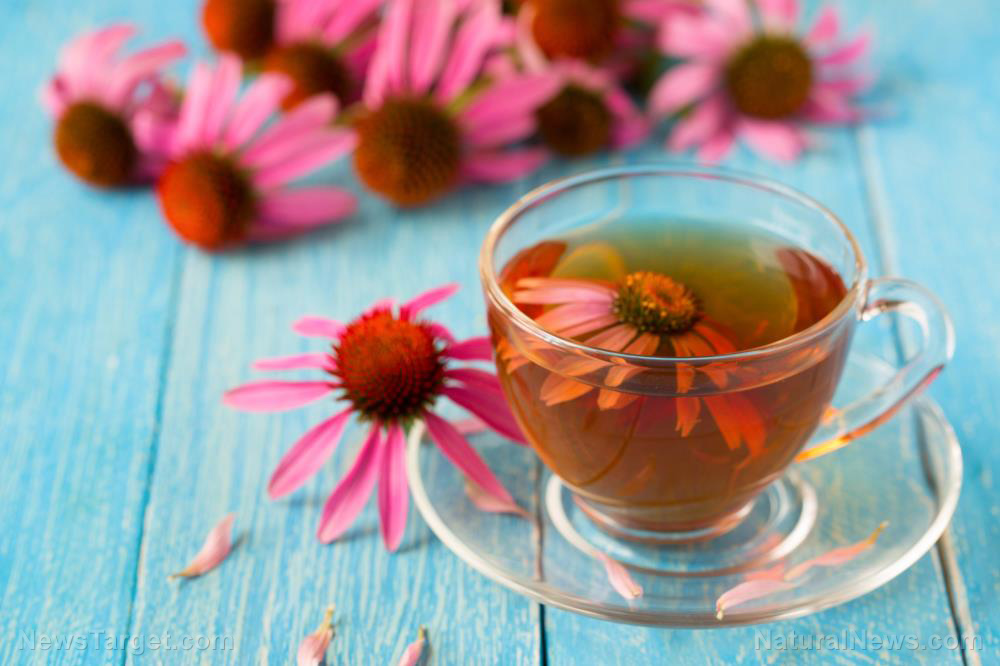
Advertisement
During flu season, people often search for natural remedies that can get rid of a cold fast. Enter echinacea. In the United States, echinacea is one of the most popular natural remedies for the common cold. It is often steeped to make tea or mixed with other herbs to get rid of the common cold or flu in no time.
Echinacea, also called coneflower, is a genus of flowering plants. You’ll often see it growing in prairies or open wooded areas in the United States. In total, there are nine species of echinacea, but healers traditionally use just one of these three for treating the common cold or flu: E. purpurea, E. angustifolia and E. pallida.
How does echinacea help treat the common cold?
Scientists now know that echinacea’s therapeutic effects can be attributed to its many active compounds, which include flavonoids, phenolic acids and alkamides. These compounds can be found in different parts of the plant, but most echinacea extracts are made from the upper part of the plant.
Thanks to these compounds, echinacea is able to do the following:
1. Strengthen your immune system
Echinacea is widely known as an immunity booster. Studies show that the herb supports the function of two types of white blood cells: macrophages and dendritic cells.
Macrophages destroy foreign substances and dead cells in your blood. Echinacea “activates” these cells, causing them to release inflammatory cytokines and recruit other white blood cells to fight infections.
On the other hand, dendritic cells help your body recognize foreign substances. Echinacea optimizes dendritic cell function and increases the release of immune molecules that help your body fight foreign invaders.
2. Fight infections
Echinacea has antiviral, antibacterial and antifungal properties. A 2014 study found that the alkamides in echinacea can destroy the cell walls of harmful fungi. This is likely how echinacea is able to combat the viruses that cause the flu and the common cold.
Research indicates echinacea may also be effective against influenza, herpes, urinary tract infection, malaria, typhoid, gum disease and vaginal yeast infections.
3. Reduce inflammation
Echinacea has anti-inflammatory properties. A 2009 study found that echinacea helped reduce inflammation caused by a viral infection. Plus, a 2002 study also showed that echinacea extracts can reduce inflammation in rats when administered orally or applied topically.
4. Support mental health
Coming down with a cold can give you more than just the sniffles. It can also affect your mood. In fact, studies show that inflammation, such as that caused by the common cold, can make you feel depressed. If you’re already depressed, a cold can make you feel much worse.
The good news is, echinacea has been shown to help with anxiety and depression. A 2013 study reported that the herb reduced anxiety in adults after three days of treatment. Researchers suggest echinacea improves mental health by stimulating levodopa, the precursor to your “feel-good” hormone.
5. Heal the skin
Though uncommon, a rash is also a symptom of the flu or the cold. It usually clears when the virus isn’t active anymore. Echinacea comes in handy when treating rashes and other skin conditions. Studies show that applying echinacea topically can reduce redness and swelling. Echinacea can also relieve itching.
6. Help relieve asthma
The common cold and the flu are top triggers for people with asthma, with 75 percent saying that their asthma symptoms get worse when they have a cold or the flu. Asthma is a lifelong condition, and controlling it hinges on avoiding triggers.
Research suggests that echinacea can reverse the secretion of asthma-related cytokines in bronchial cells. In addition, echinacea was shown to be just as effective as budesonide, an asthma medication.
7. Help alleviate pain
Echinacea can also relieve pain associated with headaches and sore throats, two common symptoms of the flu and the common cold. In fact, natural healers in Native American tribes, including the Lakota, used echinacea as a medicine for pain. E. purpurea is believed to have the strongest pain-relieving effects.
Echinacea is safe for most people. However, some might experience side effects, such as stomach pain, nausea and dizziness. In rare cases, severe allergic reactions might occur.
If you’re allergic to chamomile, ragweed, daisies and marigolds, you may also be allergic to echinacea. Consult a certified natural health practitioner before using echinacea if in doubt.
Recipe for cold-busting echinacea tea
Echinacea is usually sold in capsules, tinctures or teas. You can make your own cold-busting echinacea tea at home by following the recipe below. You can make large batches of this in advance and store it until needed.
Ingredients:
- 1/4 cup dried echinacea
- 1 teaspoon dried lemongrass
- 1 teaspoon dried mint
Preparation:
- Place all three herbs in a cup.
- Bring 8 ounces of water to a boil. Pour this into the cup.
- Steep for about 15 minutes. Strain to remove the flowers and leaves. Serve hot.
- You can add organic honey, ginger or other ingredients to create a combination you’ll enjoy.
Echinacea is a powerful natural medicine for the common cold or the flu. It can help treat your symptoms fast and reduce the duration of a viral infection. Steep it with other medicinal herbs to make an effective cold-busting tea.
Sources:
Advertisements







